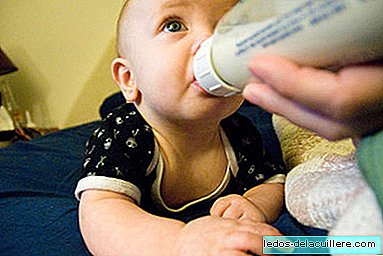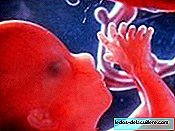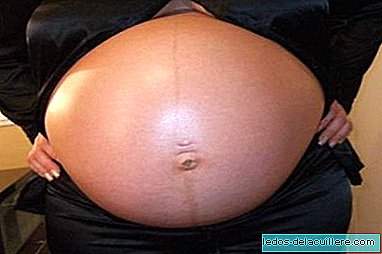
After several days talking about proteins, milk, derivatives and first yogurts, the issue of continuation milks, well are not really necessary If we consider that they provide more protein than breast milk and more than starter milk.
Breast milk is the best food for babies and children and is recommended for up to two years or more. For cases where babies are not fed with breast milk, ideally, they should be fed with a preparation as adapted as possible to the needs of babies.
Today these preparations are artificial milks, among which we can distinguish starter milk, which is known as "type 1" and continuation milk or "type 2".
Between type 1 milk and type 2 milk (starting or continuing) the first is the one that is most adapted since it has a smaller amount of protein.
How many proteins do milks have
Breast milk provides babies with about 0.9 g of protein per 100 ml.
Cow's milk, which would be the alternative to breast milk has an excessive amount of protein: 3.3 g per 100 ml. How this amount is impossible to assimilate for babies milks are adapted by complicated processes that decrease the concentration of proteins.
According to REAL DECREE 867/2008, which regulates infant formulas and continuation preparations in Spain, a suitable starting formula for infants should have between 1.2 and 1.4 g of proteins per 100 ml.
This amount is higher than the concentration of breast milk because being proteins of lower biological value there has to be a little more.
The same document, when it specifies the protein values that the continuation milks should have, establishes the margins between 1.2 and 2.4 g of proteins per 100 ml (they tend to be around 1.5-2.1 g).
Why there are continuation milks
Formerly there was only one type of formula milk that children took as long as it took. The International Code of Breast Milk Substitutes prohibits brands from advertising artificial milk so that moms and future moms do not receive confusing messages and to breastfeed their babies until at least six months of age.
For this reason the brands decided to create a milk that babies could drink after six months and that many countries, including Spain, allow advertising, the continuation milks.
These milks have a higher concentration of proteins that would be harmful to newborns and babies of a few months, but that is assimilable by six-month-old babies, who have a more mature renal function.
For example, Cow & Gate, a major manufacturer of artificial milk in the United Kingdom, says on its website and in the advertising of its products that continuation milk is to be used after six months as part of a mixed diet Y never as a substitute for breast milk before six months (“Follow-on milk is only for babies over 6 months, as part of a mixed diet and should not be used as a breastmilk substitute before 6 months”).
Do babies need more protein?
As babies grow they need more protein, although the reality is that they need very few more proteins. As they grow at a slower speed they need less protein per kilogram of weight.
That slight increase in the requirements is remedied with complementary feeding (in fact you do not have to think about how to provide more protein to babies, since the difficult thing is not to take what they need, but not to take extra protein).
It is not necessary, therefore, to increase the amount of protein in milk (Breast milk has, as I say, 0.9 g of protein per 100 ml and breastfed children do not need to change milk at six months).
Enriched with proteins
When it appeared for sale, there were brands that dared to use a slogan similar to: "Enriched with proteins for the growing needs of your baby."
The slogan is obviously a manipulation of reality. It is true that they have more protein, but not as enrichment because babies require that increase in milk, but as a consequence of a process of minor adaptation of milk. They had to remove the slogan, of course.
Advantages of continuation milk for multinationals
The brands of artificial milk obtain two clear benefits with the manufacture of continuation milks.
The first one is the possibility of advertise your product. When announcing type 2 milk, they indirectly announce type 1, since they manufacture exactly the same cans (except for the number 1 and 2).
The second is that the manufacturing process is more economical. As six-month-old babies are able to assimilate a larger amount of protein, milk processing is lower and therefore manufacturing costs are also lower.
Advantages of continuation milk for users

The only advantage is economic. ESPGHAN has stated that continuation milks are useful for families with few resources. Starting milk is not exactly economical and twelve months giving type 1 milk can be a lot of money for which families.
Many parents, faced with such an expense, are tempted to give cow's milk early and, for these families, continuation milk is a good resource, since it is more adapted than cow's milk and is something (not much) cheaper than starter milk.
Disadvantages of continuation milk for users
The disadvantage is that it has more protein than starter milk. At six months babies start eating meat, vegetables, fruits and cereals, which also have proteins and, although they can assimilate a larger amount of protein, it is easy for them to take too much.
Between six and twelve months a baby needs about 20 g of protein daily and it is estimated that they are currently taking about 30 grams.
The fact that continuation milk has more protein than starter milk helps this excess daily protein in the baby's diet.
WHO, in fact, has long since declared that they are unnecessary milks (except for the economic nuance).
Conclusion
A baby who drinks artificial milk can start drinking milk after six months, although It is recommended that you continue drinking the starter milk for at least 12 months.
In case the parents cannot afford the starter milk, they can go on to the continuation milk and try not to offer an excess of protein with the rest of the diet (well, in fact all parents should try this).












